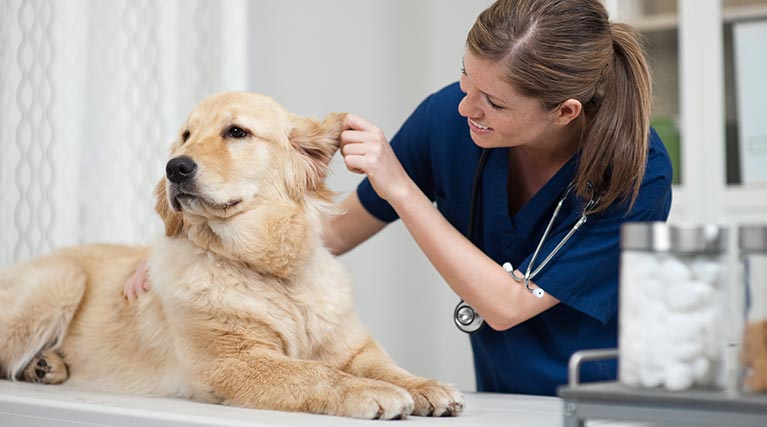Vet Enterprise: Giving Exceptional Solutions for Pets of All Ages and Sizes
Vet Enterprise: Giving Exceptional Solutions for Pets of All Ages and Sizes
Blog Article
Inoculation Guidelines From Your Relied On Vet
Vaccination standards given by your relied on vet play a vital role in protecting your pet's health and health. Furthermore, resolving usual misunderstandings bordering vaccines can even more enhance family pet owners' confidence in these preventative actions.

Importance of Vaccinations
Inoculations play a crucial duty in securing pet dogs against a variety of preventable diseases. By promoting the immune system to recognize and battle specific microorganisms, vaccines significantly reduce the occurrence of infectious conditions that can influence a pet's wellness and durability. Not only do inoculations shield private animals, but they additionally add to herd resistance, thus reducing the general prevalence of conditions in the pet population.
Timely inoculations help to minimize the spread of illness such as rabies, parvovirus, and distemper, which can have severe consequences for both animals and people. Furthermore, inoculations are commonly a demand for boarding facilities, grooming solutions, and dog parks, making them crucial for those who desire to mingle their animals.

Core Vaccinations for Animals
While the specific inoculation requirements of pets can differ based on specific elements, core vaccinations are generally recommended to protect versus the most usual and severe illness (Vet Enterprise). Core vaccines are those regarded vital for all pets, despite their way of life or geographic area, as they secure against highly transmittable and possibly fatal illnesses
For pet dogs, the core vaccinations consist of those for canine distemper, parvovirus, adenovirus (liver disease), and rabies. Canine distemper is a viral condition that influences the respiratory, intestinal, and nerve systems. Parvovirus is known for causing extreme intestinal illness, particularly in puppies. Adenovirus can cause liver condition, while rabies is a zoonotic illness that postures a danger to both people and pets.
In pet cats, core injections include feline panleukopenia, feline calicivirus, feline herpesvirus (rhinotracheitis), and rabies. Feline panleukopenia is an extremely transmittable viral condition that influences the body immune system and intestinal tracts. Calicivirus and herpesvirus are significant factors to upper respiratory system infections in felines, while rabies stays a crucial problem for public wellness.
Talk to your vet to guarantee your pets receive their core vaccinations on time.
Non-Core Vaccines Explained
Non-core vaccinations are customized to attend to particular risks associated with a pet's exposure, lifestyle, and environment to certain diseases. Unlike core injections, which are globally recommended for all pet dogs, non-core injections are considered based upon individual scenarios. These vaccinations are particularly important for family pets that might encounter distinct pathogens due to their geographical place, travel routines, or activities.
Instances of non-core vaccines consist of those for Bordetella bronchiseptica, which is linked to kennel coughing, and Lyme disease, triggered by ticks. Family pets that frequently connect with other pets, such as those in boarding facilities, pet parks, or grooming atmospheres, might gain from Bordetella inoculation. Similarly, if you stay in an area where Lyme condition prevails, immunizing against this condition can be a sensible choice for outdoor-loving dogs.
Other non-core injections might consist of those for leptospirosis, canine influenza, and feline leukemia, relying on the particular danger factors present. It is important to have an extensive discussion with your vet about your family pet's way of living and discover here the potential need for these injections, making certain a tailored vaccination technique that ideal protects your furry pal.
Inoculation Set Up Overview

As family pets grow, it is necessary to stick to the suggested booster inoculations. Pet Vaccinations. For grown-up pets, core vaccinations are usually given every one to three years, depending on the details vaccine and neighborhood guidelines. Non-core injections might be encouraged based upon way of life elements and local illness occurrence, necessitating a tailored technique
Normal vet exams are critical for updating vaccination routines. Your veterinarian can supply support on the most suitable immunizations for your pet, factoring in age, wellness standing, and environmental risks. By staying aggressive and educated, pet owners can ensure their hairy buddies receive prompt and reliable inoculations, thereby protecting their health and wellness and well-being throughout their lives.
Typical Myths Regarding Vaccines
Misunderstandings about family pet inoculations can cause confusion and hesitation among animal proprietors pertaining to the booster shot procedure. One widespread misconception is that injections are unneeded for interior family pets. While it's true that anchor interior animals face reduced threats, they are not totally unsusceptible to conditions, as virus can be presented with numerous ways, consisting of human apparel and other family pets.
Another misconception is that vaccines can cause the diseases they intend to avoid. Actually, the majority of injections contain inactivated or attenuated microorganisms, which can not cause condition in healthy and balanced animals. Some pet proprietors likewise believe that their family pets ought to not be immunized if they are already healthy and balanced; however, inoculations are a proactive measure that aids stop the start of health problem.
Additionally, many animal owners fear that vaccinations will certainly lead to long-term health issues. The advantages of inoculation-- safeguarding pet dogs from possibly life-threatening diseases-- far outweigh the risks.
Verdict
In summary, adherence to inoculation guidelines is crucial for ensuring the wellness and longevity of animals. Resolving typical misconceptions surrounding inoculations even more enhances the importance of educated decision-making in pet treatment.
Not just do vaccinations shield private pets, but they likewise add to herd immunity, consequently reducing the general prevalence of illness in the pet dog populace.
Mistaken beliefs about animal inoculations can lead to confusion and reluctance amongst pet proprietors regarding the booster shot process. While it's real that interior animals face reduced dangers, they are not completely immune to diseases, as virus can be presented via various useful link methods, including human clothes and various other animals.
Some animal owners additionally think that their pet dogs should not be vaccinated if they are currently healthy; however, vaccinations are a positive measure that assists protect against the start of health problem.
The benefits of inoculation-- shielding pets from possibly lethal diseases-- far exceed the threats.
Report this page